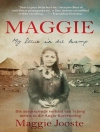When literary biographer and memoirist Louise De Salvo embarked upon a journey to learn why her father came home from World War II a changed man, she didn’t realize her quest would take ten years, and that it would yield more revelations about the man—and herself—and the effect of his military service upon their family than she’d ever imagined. During his last years, as he told her about his life, De Salvo began to understand that her obsession with war novels and military history wasn’t merely academic but rooted in her desire to understand this complex father whom she both adored and reviled because of his mistreatment of her. Although she at first believes she wants to uncover his story, the story of a man who was no hero but who was nonetheless adversely affected by the his military service, she learns that what she really wants is to recover the man that he was before he went away.
As De Salvo and her father uncover his past piece-by-piece, bit-by-bit, she learns about the dreams of a working-class man who entered the military in the late 1930s during peacetime to better himself, a man who wanted to become a pilot. She learns about what it was like for him to participate in war games in the Pacific prior to the war, and its devastating toll. She learns about what it was like for her parents to fall in love, set up house, marry, and have children during this cataclysmic time. And as the pieces of her father’s life fall into place as works to piece together the puzzle of everything she’s learned about this time, she finds herself finally able to understand him.
Chasing Ghosts is an original contribution to the understanding of working-class World War II veterans who did not conventionally distinguish themselves through “heroic” actions and whose lives were not until recently considered worthy of historical or cultural attention. It personalizes the history of those sailors who served in the Navy aboard aircraft carriers and on islands in the Pacific prior to, and during World War II and contributes to the current vital conversation about the often-unrecognized effects of war and its traumas upon those men and their families. It reveals the lifelong devastating consequences of military service on those men and women who fell in love, married, and set up house. And it reveals the complexity of what it is like to be the daughter of a father who has gone to war.
Giới thiệu về tác giả
Louise De Salvo started the MFA in Memoir Program at Hunter College where she held the Jenny Hunter Endowed Chair for Literature and Creative Writing until her retirement in 2017. She is the author of several books including Virginia Woolf, Vertigo, and The Art of Slow Writing.












